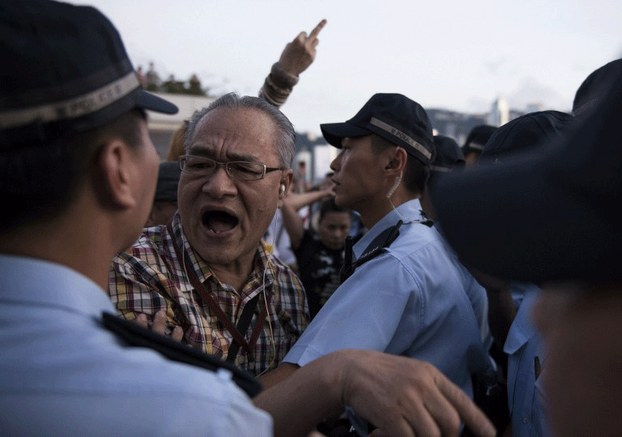




Beijing on Tuesday issued a strong reminder that it rules Hong Kong, as political activists in the former British colony stepped up a campaign for universal elections in 2017.
Hong Kong was promised a "high degree of autonomy" under the terms of its 1997 return to Chinese rule, within the "one country, two systems" framework agreed between British and Chinese officials and enshrined in its mini-constitution, the Basic Law.
However, China's cabinet, the State Council, said such autonomy was still subject to the will of Beijing.
"The high degree of autonomy of Hong Kong is not full autonomy, nor is it decentralized power," the State Council said in a white paper on Hong Kong issued on Tuesday.
"It is the power to run local affairs as authorized by the central leadership," it said, adding: "There is no such thing as 'residual power'."
The move comes ahead of a planned "Occupy Central" pro-democracy protest that could bring part of the territory's business district to a standstill.
Nothing new
Benny Tai Yiu-ting, an associate professor of law at the University of Hong Kong and one of the organizers of Occupy Central, said there was nothing new in the white paper, however.
"One country, two systems isn't just what someone declares it to be; the one country, two systems concept has always had its own vitality," Tai said.
"One country, two systems is actually in the process of trying to find its own level in the midst of our struggle to achieve true democracy," he said.
Labour Party chairman and trade unionist Lee Cheuk-Yan said he believed the white paper was intended as a stark warning to activists seeking universal suffrage, however.
"Of course I think central government is firing a few shots across our bows," Lee said. "They want to suppress the desire for universal suffrage among Hong Kong people."
"Now, the government has unmasked itself, because previously they always said there was room for negotiation, and they would listen to the opinions of Hong Kong people."
He said only time would tell if the move had worked, however.
"I believe that there will be a backlash against it," Lee said.
Hong Kong Legislative Council Member and leader of the Civic Party Alan Leong also questioned the timing of the white paper.
"It is apparently aimed at the Occupy Central activities scheduled for June 20 to 22. It wants to scare off Hong Kong people, making them not to stand up and vote. I hope Hong Kong people understand that this referendum is a rare opportunity — if we do not stand up now, our wish for universal suffrage will never come true."
Another Hong Kong Legislative Council Member Emily Lau said the people of Hong Kong generally did not welcome the white paper.
"I do not have time to read the whole document but from the questions the media asked me I think the white paper is perceived negatively in Hong Kong," she said.
"The media is feeling the pressure from Beijing. However, I don’t feel pressured. Is it so easy to pressure the Hong Kong people? "
'Lopsided'
The report said Hong Kong's political arrangements were now faced with "new circumstances and new problems."
"Some are even confused or lopsided in their understanding of 'one-country, two-systems' and the Basic Law," the white paper said.
Independent political commentator Johnny Lau said the white paper suggested that Beijing's confidence in the "one country, two systems" formula is beginning to waver.
"The central government feels that some hostile overseas forces are stripping it of its right to lead Hong Kong," Lau told RFA. "They want to expel those forces through this white paper."
"The central government has never used the words 'absolute power' so transparently in the past," he said. "This shows that the government is already worried about its rule in Hong Kong."
However, the Hong Kong Special Administrative Region (SAR) government's chief executive Leung Chun-ying, who was chosen by an election committee handpicked by Beijing, said the report setting out China's position on Hong Kong's political role had taken a year to write.
While China has agreed to let Hong Kong elect its next leader in 2017, it remains unclear whether or not candidates must first be vetted by pro-Beijing politicians and officials.
Such a move would effectively rule any candidates from opposition democratic parties, or independents not approved by the ruling Chinese Communist Party, out of the race.
Senior officials have already hinted that nominations should be decided by a small committee of about 1,200 largely pro-Beijing loyalists.
Reported by Lin Jing for RFA's Cantonese Service and Xin Lin for Mandarin Service. Translated by Luisetta Mudie and Ping Chen. Written in English by Luisetta Mudie.